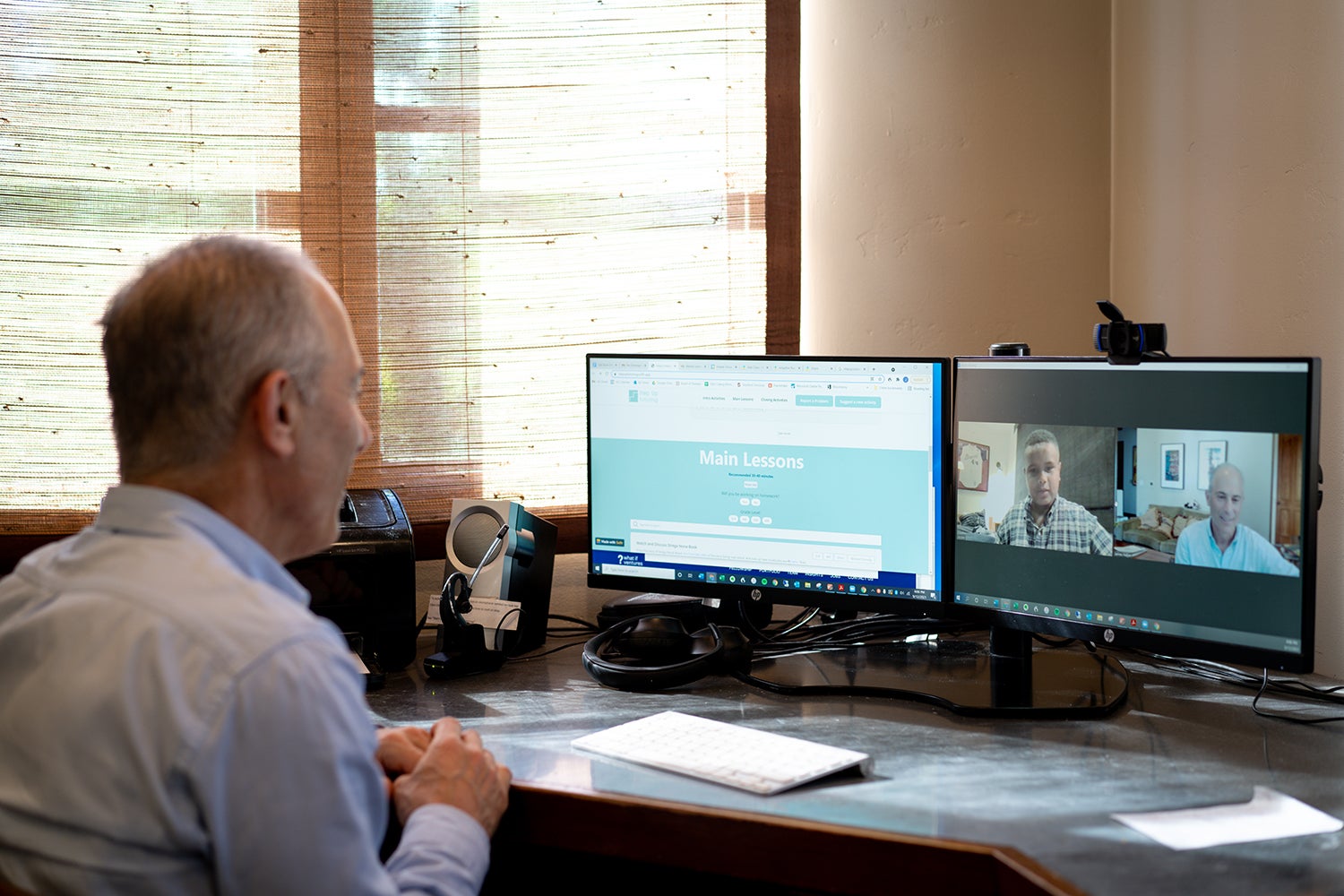When the schoolchildren enrolled in Step Up Tutoring gathered online for movie nights over the summer, they provided entertaining play-by-play commentary in the chat during the films and held spirited discussions about their favorite moments after the credits rolled.

Jayden Williams is one of more than 800 students in Los Angeles receiving free one-on-one online tutoring through Step Up Tutoring, which was co-founded by a Stanford student and an alum during the pandemic. (Image credit: Owen Dubeck)
One evening after the film had ended, the kids asked if they could stay on the Zoom call with their host, Amy Wentzel, a Stanford senior majoring in science, technology and society in the School of Humanities and Sciences.
“I said ‘yes’ of course, and we ended up talking another 45 minutes,” said Wentzel, who is an intern on the nonprofit organization’s pedagogy team. “They wanted hear all about my life as a college student and we dreamed out loud about what their futures could look like. It was an incredible bonding experience.”
During the day, students enrolled in the program, which serves third to sixth graders in the Los Angeles Unified School District, met one-on-one with tutors in online sessions tailored to their educational needs and interests. In the evening, they participated in group activities – game nights, origami lessons, Spanish book club meetings, cardio get-togethers, art classes, meditation sessions, CPR demonstrations and more.
“I love, love, love seeing the kids interact with one another over Zoom,” Wentzel said. “Since Step Up Tutoring is a virtual program, the kids do not have too many opportunities to interact with one another in person, but we have built a strong community nevertheless.”
An idea born of circumstances
During the summer of 2020, Daniel Halper was a rising senior studying product design in the School of Engineering and living at home in Los Angeles. He learned that students in underresourced communities in the city were struggling academically and emotionally due to school closures and stay-at-home mandates related to the pandemic.
“We started Step Up Tutoring with the idea that we could change all that,” said Halper, BS ’21, who co-founded the group with Stanford alumna Nati Rodriguez, who earned a bachelor’s degree in science, technology and society in 2003, and a master’s degree in education in 2004.
Halper said the school district’s decision to distribute Chromebooks and provide access to high-speed internet gave schoolkids in Los Angeles the technology they needed to attend tutoring sessions and gather together online – and made Step Up Tutoring possible.
The organization, which signed a memorandum of understanding with the school district, is currently providing free one-on-one online tutoring and mentorship to more than 800 students ranging in age from 8 to 12. Most of the students come from Latinx families.
To identify students who might benefit from the program, Rodriguez reaches out to school principals, who contact teachers, who talk to parents.
Matching tutors with kids
In an online questionnaire, parents choose their reason for enrolling their child in the program from a list of options that includes struggles with English, reading or math; a need for mentorship; and regular class material that is too easy. Parents also indicate whether their child’s primary language is English or Spanish, and identify some of their child’s interests: animals (animales); art (arte); creative writing (escritura creativa); dance (baile); music (música); science (ciencia); sports (deportes); and video games (videojuegos).
Volunteers, who coordinate their schedules with the student’s family, commit to spending two hours a week tutoring students for a minimum of 12 weeks.
Step Up Tutoring trains the volunteers in the tenets of tutoring, especially online tutoring. The organization also provides lesson plans to tutors that begin with a 10-minute fun activity followed by a 40-minute academic session and end with a 10-minute game focused on subjects other than math and English.
Since its founding, 49 Stanford students and alumni have tutored and/or interned at the nonprofit organization.
Halper serves as the group’s program coordinator and chief technology officer. He is also a tutor.
He recently began his second year tutoring Jayden, who just started fifth grade. Last year, they worked primarily on math – multiplication with two-digit numbers and long division. They also read books and studied geography, and created a music video using coding.
“I think Jayden appreciates the one-on-one attention,” Halper said. “Just having an adult listen to him and hear about his day seems to make a big difference. On the academic side, we work on math concepts that he likely would not be able to grasp without someone there to answer his questions.”
Anthony Beron Jr., a Stanford senior majoring in aerospace engineering, has tutored two boys as a Step Up Tutoring volunteer – helping one with English and encouraging the other to pursue his big dreams about creating shows for Nickelodeon.
Beron said tutors are like understanding older siblings, ready to answer whatever questions the children might pose.
“Sometimes all we do is talk about their assignments, but sometimes we also talk about whatever they like, such as cartoons and games,” he said. “We’re really there for the kids.”
Step Up Tutoring has a waitlist of 150 children and is looking for tutors with a bachelor’s or an associate’s degree – or are in the process of earning one – who enjoy working with kids. To learn more, visit the Step Up Tutoring website.
